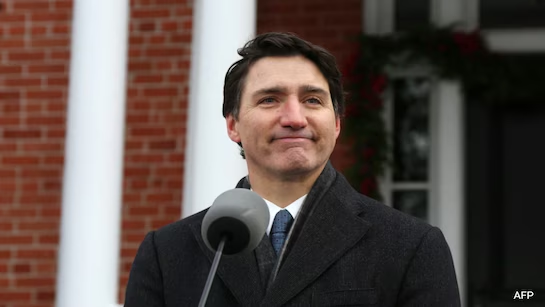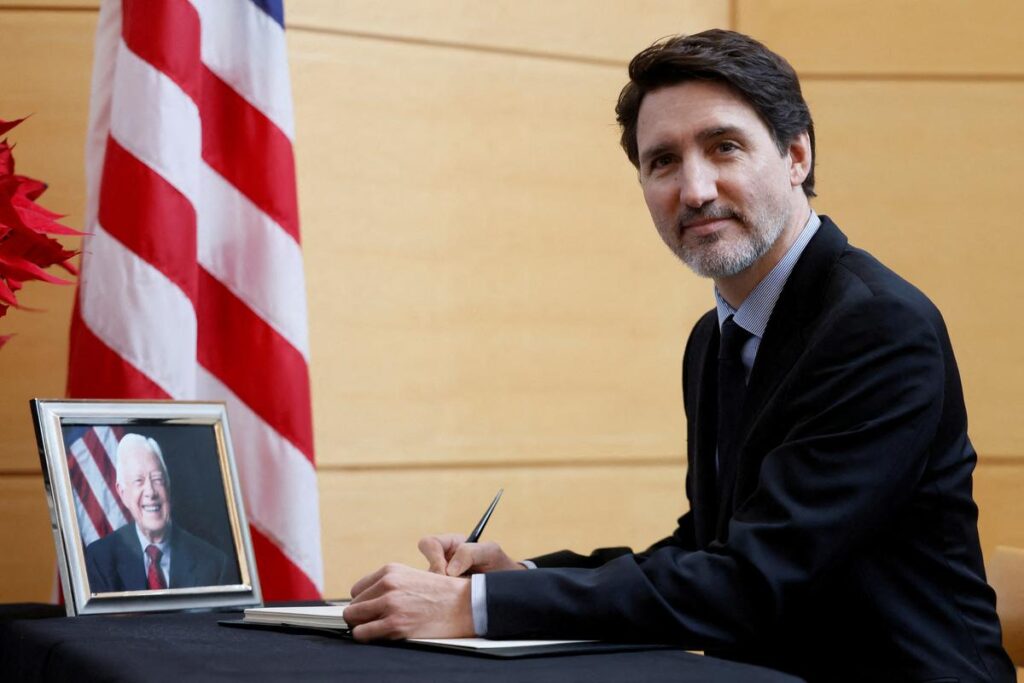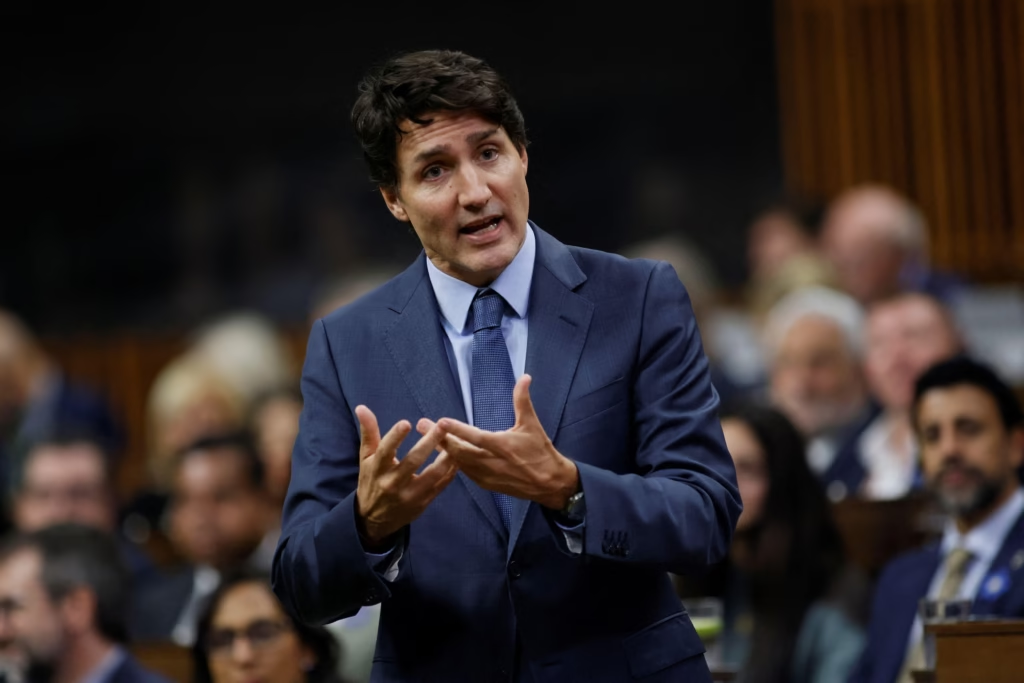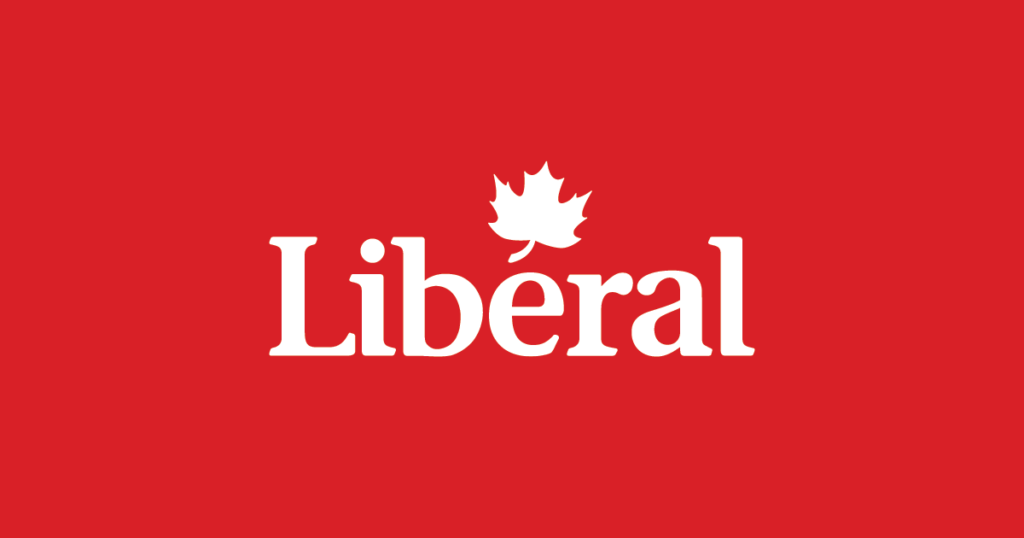Justin Trudeau steps down as Canada’s Prime Minister after nearly a decade, leaving behind a legacy of progressive reforms, political challenges, and a reshaped Canadian political landscape. Explore the factors leading to his resignation and the implications for the nation’s future.
Table of Contents
On January 6, 2025, Canadian Prime Minister Justin Trudeau announced his resignation as leader of the Liberal Party and Prime Minister of Canada. This moment marked the conclusion of nearly a decade-long tenure that significantly shaped Canada’s political and social landscape. Trudeau’s departure has sparked widespread discussions about his legacy, the factors leading to his resignation, and the future of Canadian politics.

Reflecting on Trudeau’s Legacy: A Decade of Change
Justin Trudeau’s tenure as Prime Minister began in 2015, when he led the Liberal Party to a historic victory, promising “real change.” His administration prioritized progressive policies, including strengthening the middle class, advancing reconciliation with Indigenous communities, addressing climate change, and promoting gender equality. These policies resonated with many Canadians, making him a symbol of hope and modern leadership.
Trudeau’s charismatic approach and inclusive vision earned him widespread support during his initial years in office. However, as his tenure progressed, challenges mounted. From political scandals to criticisms of economic management, his leadership faced growing scrutiny. Despite this, Trudeau’s administration introduced several transformative measures, such as legalizing cannabis, implementing a national carbon pricing strategy, and advancing LGBTQ+ rights. These accomplishments cemented his reputation as a reformist leader, though they also sparked polarizing debates.

The Catalysts Behind Trudeau’s Resignation
Trudeau’s resignation is the culmination of several challenges, both within his party and in the broader political sphere. Key factors contributing to his decision include:
Internal Party Struggles
Trudeau faced increasing dissent within the Liberal Party, with several Members of Parliament (MPs) questioning his leadership. Reports suggest that some MPs openly called for his resignation, citing concerns about the party’s direction under his leadership. This internal discord highlighted deep divisions within the party, making it difficult for Trudeau to maintain unity.
Cabinet Resignations
The departure of high-profile cabinet members further weakened Trudeau’s position. Notably, Chrystia Freeland, who served as both Finance Minister and Deputy Prime Minister, resigned in December 2024. Freeland’s resignation was seen as a significant blow to the Trudeau administration, given her prominent role in managing Canada’s economic policies and international relations. Other key resignations followed, signaling broader dissatisfaction within the government.
Declining Public Support
Public opinion polls in late 2024 painted a grim picture for the Liberal Party. Vote intent for the party plummeted to 16%, a historic low, while Trudeau’s personal approval ratings dropped to 22%. These figures reflected growing dissatisfaction among Canadians, driven by concerns over inflation, housing affordability, and perceived government inaction on pressing issues.
Calls for Accountability
Opposition parties and public figures intensified their calls for Trudeau’s resignation in the months leading up to his announcement. Conservative leader Pierre Poilievre accused Trudeau of mismanaging the economy and eroding public trust, while NDP leader Jagmeet Singh criticized the Liberal Party’s failure to address systemic issues.

Public and Political Reactions
Trudeau’s resignation has elicited a wide range of reactions, highlighting the complexity of his legacy:
Opposition Parties
Pierre Poilievre, leader of the Conservative Party, seized the opportunity to demand an early election, stating that Canadians deserve a fresh start. He criticized the Liberal Party for its internal disarray and positioned himself as the leader capable of restoring stability and economic growth.
Jagmeet Singh, leader of the New Democratic Party (NDP), welcomed Trudeau’s resignation but emphasized that the Liberal Party’s issues extend beyond its leader. Singh called for systemic reforms to address economic inequality and climate change.
Public Sentiment
Canadians’ reactions to Trudeau’s resignation have been mixed. Supporters expressed gratitude for his efforts to advance progressive policies, while critics highlighted his administration’s shortcomings. Social media platforms were flooded with tributes, critiques, and discussions about Canada’s political future.
Cultural Commentary
In a lighthearted yet telling reaction, a Dairy Queen outlet in Langley, British Columbia, offered $2 burgers to celebrate Trudeau’s resignation. This unconventional promotion became a viral sensation, reflecting both humor and public engagement with the political event.

Implications for Canadian Politics
Trudeau’s resignation marks a significant turning point for Canada’s political landscape. The Liberal Party now faces the daunting task of selecting a new leader and regaining public trust ahead of the next federal election. Key implications include:
Leadership Transition
The Liberal Party has announced plans for a nationwide leadership contest to identify Trudeau’s successor. This process will be crucial in determining the party’s future direction and its ability to compete in the next election.
Parliamentary Prorogation
Trudeau’s decision to prorogue Parliament until March 24, 2025, provides the Liberal Party with time to navigate this transition. However, it also raises concerns about legislative delays and the government’s ability to address pressing issues during this period.
Electoral Landscape
Trudeau’s resignation reshapes the dynamics of the upcoming federal election. The Conservative Party, led by Poilievre, is well-positioned to capitalize on the Liberal Party’s vulnerabilities. Meanwhile, the NDP aims to present itself as a viable alternative, advocating for bold reforms to address economic and social challenges.

Frequently Asked Questions
Why did Justin Trudeau resign?
Trudeau cited internal party conflicts and declining public support as primary reasons for his resignation. He stated that Canada deserves a real choice in the next election.
Who will succeed Justin Trudeau as Prime Minister?
Trudeau will remain in office until the Liberal Party selects a new leader through a competitive process. The successor will then assume the role of Prime Minister.
What is the timeline for the leadership transition?
Parliament has been prorogued until March 24, 2025, to facilitate the leadership transition. The exact timeline will depend on the Liberal Party’s internal processes.
How does this affect the upcoming federal election?
The Liberal Party’s new leadership will play a significant role in shaping its strategy and public appeal in the forthcoming election. The transition period may impact the party’s preparedness and policy platforms.
What are the main challenges facing the new leadership?
The incoming leader must address internal party unity, rebuild public trust, and formulate policies that resonate with Canadians amid current economic and social challenges.

Looking Ahead: A New Chapter for Canada
Justin Trudeau’s resignation opens the door for political renewal and potential shifts in Canada’s policy direction. As the Liberal Party embarks on selecting a new leader, Canadians await clarity on the nation’s future trajectory. The forthcoming leadership contest and subsequent federal election will play a pivotal role in addressing critical issues such as economic stability, housing affordability, climate action, and reconciliation with Indigenous communities.
While Trudeau’s resignation marks the end of an era, it also serves as a reminder of the evolving aspirations and concerns of Canadians. The road ahead is filled with challenges and opportunities, and the nation’s political leaders must rise to the occasion to build a stronger, more inclusive future for all.
Join the conversation! Share your thoughts on Justin Trudeau’s resignation and what it means for Canada’s future. Leave a comment or share this article to spark meaningful discussions.


